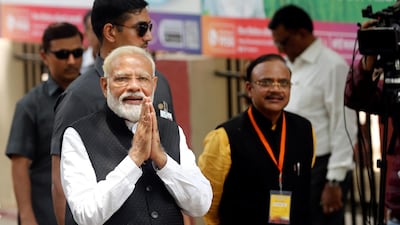Prime Minister Narendra Modi filed nomination papers in the Hindu holy city of Varanasi on Friday, hoping to hold on to the seat for a second time in India's general elections.
He prayed at a temple before arriving at the election office in Varanasi in Uttar Pradesh state, flanked by Amit Shah, president of his Hindu nationalist Bharatiya Janta Party, and several state chief ministers. As his car passed, people shouted slogans such as "Har Har, Modi!" or "Hail, Modi!"
Thousands of BJP activists, some carrying party flags and sporting saffron caps, waved at Mr Modi who responded with a smile. People also showered rose petals on him. Many were perched on the road dividers and many more watched the show from windows and roofs of homes on both sides of the roads.
Voting in three of the seven phases of the staggered elections has finished. In total, some 900 million people are registered to vote for candidates to fill 543 seats in India's lower house of Parliament. Voting concludes on May 19 and counting is scheduled for May 23.
With around 1.7 million voters, Varanasi will go the polls on May 19. The election is seen as a referendum on Mr Modi and his party. The campaigning has been marred by accusations, insults and unprecedented use of social media to spread false information.
Varanasi is one of the holiest cities for Hindus in India and is based at the banks of the Ganges river. Hindus believe Varanasi is the centre of the world and anyone who dies in the city attains salvation.
Invoking Hindu symbolism, mr Modi told party workers before filing his nomination papers: "Mother Ganga will take care of me."
"Last time when I contested nobody told me to come here, nobody sent me to Varanasi. Mother Ganga has invited me," he said.
Modi supporters say the tea seller's son from Gujarat state has improved the nation's standing. But critics say his party's Hindu nationalism has aggravated religious tensions in India.
In his five years as prime minister, Mr Modi has pushed to promote the secular nation of 1.3 billion people and nine major religions as a distinctly Hindu state. He has rallied his support base with Hindu mega projects across India, including in Varanasi, but has also been blamed for rising attacks by Hindu mobs against minorities, mainly Muslims who number about 170 million.
Mr Modi and his party have also adopted aggressive nationalism, using the disputed Himalayan region of Kashmir to pivot away from his economic record and playing up the threat of rival Pakistan. The approach was employed especially after a suicide bombing in Kashmir on February 14 killed 40 soldiers, allowing Mr Modi to portray himself as a strong, uncompromising leader on national security.
Manish Shukla, a science doctorate student at Banaras Hindu University in Varanasi, said that although he had no particular political leanings, he would vote for Mr Modi. "I do not see any alternative because the different alliances have so far failed to tell people who will be their prime minister candidate," he said.
"Modi is sure to win here. There is no scope for others," said Ramesh Singh, a local trader. "The opposition has fielded weak candidates."

